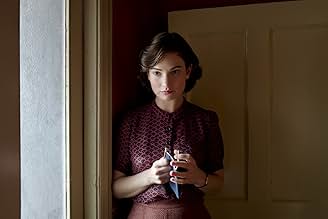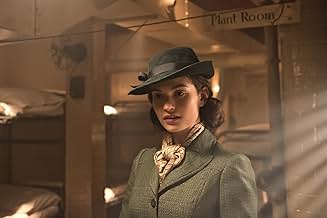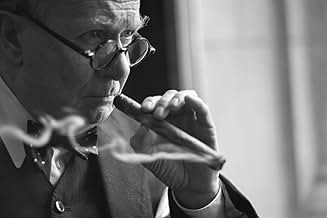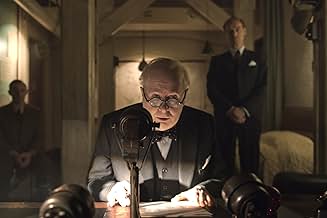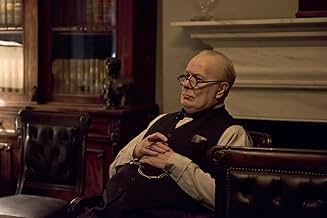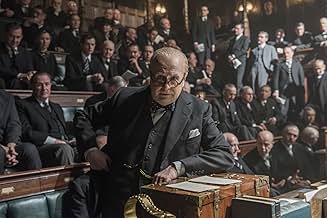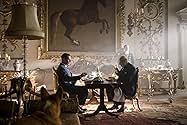In May 1940, the fate of World War II hangs on Winston Churchill, who must decide whether to negotiate with Adolf Hitler, or fight on knowing that it could mean the end of the British Empire... Read allIn May 1940, the fate of World War II hangs on Winston Churchill, who must decide whether to negotiate with Adolf Hitler, or fight on knowing that it could mean the end of the British Empire.In May 1940, the fate of World War II hangs on Winston Churchill, who must decide whether to negotiate with Adolf Hitler, or fight on knowing that it could mean the end of the British Empire.
- Won 2 Oscars
- 54 wins & 81 nominations total
Adrian Rawlins
- Air Chief Marshal Dowding
- (as Adrian Rawlings)
- Director
- Writer
- All cast & crew
- Production, box office & more at IMDbPro
Featured reviews
At this point, "Darkest Hour" has an overall rating of 5.3. I do not understand this at all, but the film has not actually been released yet and has only been seen in film festivals. I assume the overall score will increase considerably--especially since the two reviews for it were quite positive.
Now I must point out that I am a retired history teacher and I consider Winston Churchill to be perhaps the greatest politician of the century. So, I clearly have a bias and predisposition towards liking the movie...especially if it's done well. Is it a crowd pleaser? Maybe not, as the average movie-goer (especially teens) might not enjoy this or care a lick about the film.
The story covers only a portion of the month of May, 1940...just before the fall of France during WWII. Prime Minster Chamberlain is about to be tossed out of office, as his appeasement strategy with Hitler has turned out to be completely stupid. In his place, some hope for Churchill to be the next Prime Minister...though some forces are working to depose him as soon as he comes to power. At the same time, the war is going as badly as it possibly can. Can Churchill survive this? Well, of course...duh, it's HISTORY!
The reasons to see this are two big ones....the film has achieved the look of 1940 beautifully and Gary Oldman provides an Oscar- winning performance in the lead. If he is not at least nominated for this top award, I will be completely shocked...and he really managed (along with ample prosthetics) to LOOK and SOUND like the great man. Great job all around...and a perfect film.
Now I must point out that I am a retired history teacher and I consider Winston Churchill to be perhaps the greatest politician of the century. So, I clearly have a bias and predisposition towards liking the movie...especially if it's done well. Is it a crowd pleaser? Maybe not, as the average movie-goer (especially teens) might not enjoy this or care a lick about the film.
The story covers only a portion of the month of May, 1940...just before the fall of France during WWII. Prime Minster Chamberlain is about to be tossed out of office, as his appeasement strategy with Hitler has turned out to be completely stupid. In his place, some hope for Churchill to be the next Prime Minister...though some forces are working to depose him as soon as he comes to power. At the same time, the war is going as badly as it possibly can. Can Churchill survive this? Well, of course...duh, it's HISTORY!
The reasons to see this are two big ones....the film has achieved the look of 1940 beautifully and Gary Oldman provides an Oscar- winning performance in the lead. If he is not at least nominated for this top award, I will be completely shocked...and he really managed (along with ample prosthetics) to LOOK and SOUND like the great man. Great job all around...and a perfect film.
This biopic of a very narrow period in Winston Churchill's life - May 1940 to be exact - was probably made to earn British actor Gary Oldman the academy award, but man, did he ever earn it! This film won Oscars for Best Actor for Oldman and for makeup, and I'd say they definitely earned that. Great trouble is taken to make sure you believe you are looking right at Sir Winston. Oldman literally disappears into the part.
The film opens with Parliament in open rebellion over Prime Minister Neville Chamberlain's failure to deal with Hitler and the opposition party demanding his resignation. Chamberlain wants Halifax to replace him, another appeasement advocate cut from the same cloth as he, but Halifax refuses saying his "time has not yet come". So Winston's party picks him literally - while holding their noses - because nobody else wants the job. And for good reason. Hitler is knocking over European countries with the ease of dominoes and the entire British army is trapped at Dunkirk, with so many damaged ships blocking the harbor that no other ship can get into it to rescue them.
Next we meet Oldman's portrayal of Sir Winston. He is a man of enormous appetites - food, drink, cigars - and sometimes tremendous temper. His spending brings him to the brink of bankruptcy multiple times. His party doesn't like him. The king resents him for how he advised his brother when he was planning to marry Wallis Simpson. And Chamberlain and Halifax STILL want to appease Hitler and because Churchill does not, they are working to undermine him, particularly with the king.
The film uses two obvious plot devices that are probably not based in fact. One is Churchill's young secretary who at first he scares to death with his tantrums, but later the two become close as he softens his approach with her . The other is a trip into a subway to get "the man on the street's opinion" about Hitler that just seems eye-rollingly over the top. There is a baby that the mother oddly says looks like Churchill, what seems like an interracial couple in 1940, and a woman who, from the way she is dressed, appears to be a socialist. Yet they to a man, to a woman, to a child, encourage Churchill to fight Hitler to the end. This fictitious event seems to be stolen from Shakespeare, but if you must steal, then steal from the best.
Honorable mention has to go to Kristen Scott Thomas as Clementine, Winston's supportive wife who is often overlooked by history. Also deserving mention is Ben Mendelsohn as King George VI, who is portraying a man much more comfortable as monarch than he was portrayed in Then King's Speech, but then this is not his story.
Yes, it is not historically accurate, but if Churchill did confront the situations and people he confronted in this film, he probably would have acted exactly as he was portrayed here.
I knock off one star for not at least TRYING to explain to the audience WHY - with Hitler obviously not trustworthy - members of Parliament would not realize the choice was between slavery and war. The answer is that WWI cost Britain a generation of young men. Literally every British young man who went to war either died or was maimed. And in the end the entire conflict seemed like it had been for nothing. And so many of the British - and more of the Americans - did not want to go through this a second time with the exact same country, not realizing until it was almost too late that the Kaiser was no Hitler.
The film opens with Parliament in open rebellion over Prime Minister Neville Chamberlain's failure to deal with Hitler and the opposition party demanding his resignation. Chamberlain wants Halifax to replace him, another appeasement advocate cut from the same cloth as he, but Halifax refuses saying his "time has not yet come". So Winston's party picks him literally - while holding their noses - because nobody else wants the job. And for good reason. Hitler is knocking over European countries with the ease of dominoes and the entire British army is trapped at Dunkirk, with so many damaged ships blocking the harbor that no other ship can get into it to rescue them.
Next we meet Oldman's portrayal of Sir Winston. He is a man of enormous appetites - food, drink, cigars - and sometimes tremendous temper. His spending brings him to the brink of bankruptcy multiple times. His party doesn't like him. The king resents him for how he advised his brother when he was planning to marry Wallis Simpson. And Chamberlain and Halifax STILL want to appease Hitler and because Churchill does not, they are working to undermine him, particularly with the king.
The film uses two obvious plot devices that are probably not based in fact. One is Churchill's young secretary who at first he scares to death with his tantrums, but later the two become close as he softens his approach with her . The other is a trip into a subway to get "the man on the street's opinion" about Hitler that just seems eye-rollingly over the top. There is a baby that the mother oddly says looks like Churchill, what seems like an interracial couple in 1940, and a woman who, from the way she is dressed, appears to be a socialist. Yet they to a man, to a woman, to a child, encourage Churchill to fight Hitler to the end. This fictitious event seems to be stolen from Shakespeare, but if you must steal, then steal from the best.
Honorable mention has to go to Kristen Scott Thomas as Clementine, Winston's supportive wife who is often overlooked by history. Also deserving mention is Ben Mendelsohn as King George VI, who is portraying a man much more comfortable as monarch than he was portrayed in Then King's Speech, but then this is not his story.
Yes, it is not historically accurate, but if Churchill did confront the situations and people he confronted in this film, he probably would have acted exactly as he was portrayed here.
I knock off one star for not at least TRYING to explain to the audience WHY - with Hitler obviously not trustworthy - members of Parliament would not realize the choice was between slavery and war. The answer is that WWI cost Britain a generation of young men. Literally every British young man who went to war either died or was maimed. And in the end the entire conflict seemed like it had been for nothing. And so many of the British - and more of the Americans - did not want to go through this a second time with the exact same country, not realizing until it was almost too late that the Kaiser was no Hitler.
10RNMorton
I cannot remember the last time I was in a movie and I said, gee I wish this movie would keep going because it's just so damn good. I don't really have to say anything more about Oldman beyond what's already been said, that was brilliant Academy Award work. Despite being a literalist on history and not enjoying Hollywood embellishments/contrivances that didn't really happen, I will repeat something I said on another movie (Patton): I am okay where a fictional event is one that could have happened (or maybe happened out of time sequence) where it is used more to show the persona of the character than to establish an historical fact. Notwithstanding this, the subway scene may have been a little much. Strong cast throughout, including the portrayers of King George VI, Chamberlain, Halifax and Churchill's lovely secretary (James). A must see for WW II buffs and appreciators of good cinema everywhere.
As a film this is quite good; it's not dull, the performances are good, the production design is excellent, the script is a professional piece of work and even Oldman's make-up is not too distracting.
However, something is not right. If most people get their history from movies, this is concerning. It's obvious that actual events occurred with real people and what they did and said but in a movie this gets pasteurized into what smart people believe will be more thrilling, more sympathetic, more emotional. That process necessarily alters things into something that is even anachronistically rendered and therefore not in the record.
This defect occurs frequently in this movie , so it's not history but myth making. A good example is Churchill's dive into the Underground to meet the common person to steel his resolve. Now Churchill had a mixed view of the average voter, and he was a patrician, but even that aside, he did not need to take a Tube train survey to gauge opinion.
This scene is poached from Shakespeare's Henry V where the king goes among his soldiers the night before battle to hear them and take courage from their strength. Steal from the best is a good policy, but it's not history. It's Shakespearean history and that trades effect for accuracy too.
The audience is given this scene to present Churchill as an instrument of democracy; he's acting for what the people want, therefore he's doing the right thing. It's called pandering.
Well, it is just a movie.
However, something is not right. If most people get their history from movies, this is concerning. It's obvious that actual events occurred with real people and what they did and said but in a movie this gets pasteurized into what smart people believe will be more thrilling, more sympathetic, more emotional. That process necessarily alters things into something that is even anachronistically rendered and therefore not in the record.
This defect occurs frequently in this movie , so it's not history but myth making. A good example is Churchill's dive into the Underground to meet the common person to steel his resolve. Now Churchill had a mixed view of the average voter, and he was a patrician, but even that aside, he did not need to take a Tube train survey to gauge opinion.
This scene is poached from Shakespeare's Henry V where the king goes among his soldiers the night before battle to hear them and take courage from their strength. Steal from the best is a good policy, but it's not history. It's Shakespearean history and that trades effect for accuracy too.
The audience is given this scene to present Churchill as an instrument of democracy; he's acting for what the people want, therefore he's doing the right thing. It's called pandering.
Well, it is just a movie.
I'm sure I am not alone in having seen everything ever filmed about the man.
But this is nothing like I have seen before. He is so funny.
We see his ability to make jokes like never before and there is more here than just dry sarcastic references.
He keeps us in stitches. He must have told 25 jokes.
This film starts in the days when Chamberlain knows he cannot continue as prime minister, alongside the crippling uncertainty of his cabinet meetings, and through to when the entire country, as a result of his speeches, stands firmly behind Churchill as war leader.
What surprised me the most was how large a role the opposition party played in Churchill's rise to power.
Excellent supporting cast from those distinguished actors we have seen in many BBC productions and "Game of Thrones".
Ben Mendelsohn's portrayal of King George VI was stunningly well done.
A real delight at Tiff - too bad no Q&A for my screening.
But this is nothing like I have seen before. He is so funny.
We see his ability to make jokes like never before and there is more here than just dry sarcastic references.
He keeps us in stitches. He must have told 25 jokes.
This film starts in the days when Chamberlain knows he cannot continue as prime minister, alongside the crippling uncertainty of his cabinet meetings, and through to when the entire country, as a result of his speeches, stands firmly behind Churchill as war leader.
What surprised me the most was how large a role the opposition party played in Churchill's rise to power.
Excellent supporting cast from those distinguished actors we have seen in many BBC productions and "Game of Thrones".
Ben Mendelsohn's portrayal of King George VI was stunningly well done.
A real delight at Tiff - too bad no Q&A for my screening.
Did you know
- TriviaGary Oldman spent a year studying Sir Winston Churchill and his mannerisms before starting on this movie.
- GoofsBlackout restrictions were imposed starting in September 1939 and strictly enforced, requiring all vehicles to be fitted with slotted covers that only allowed a tiny sliver of light to be directed downwards toward the road. However, all the vehicles in the street scenes had fully exposed headlights.
- Quotes
Winston Churchill: You cannot reason with a tiger, when your head is in its mouth!
- Crazy creditsAt the end of the closing credits the Big Ben clock is heard striking.
- ConnectionsFeatured in CTV National News: Episode dated 7 September 2017 (2017)
- How long is Darkest Hour?Powered by Alexa
Details
- Release date
- Countries of origin
- Official site
- Languages
- Also known as
- Las horas más oscuras
- Filming locations
- Wentworth Woodhouse, Wentworth, Rotherham, South Yorkshire, England, UK(Buckingham Palace)
- Production companies
- See more company credits at IMDbPro
Box office
- Budget
- $30,000,000 (estimated)
- Gross US & Canada
- $56,468,410
- Opening weekend US & Canada
- $175,006
- Nov 26, 2017
- Gross worldwide
- $150,847,274
- Runtime
- 2h 5m(125 min)
- Color
- Sound mix
- Aspect ratio
- 1.85 : 1
Contribute to this page
Suggest an edit or add missing content







